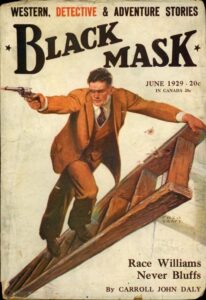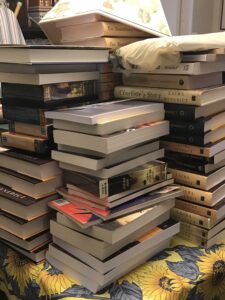by James Scott Bell
@jamesscottbell
 Would there be a Mike Romeo without Race Williams?
Would there be a Mike Romeo without Race Williams?
Scholars are pretty much in agreement that the first—and for a couple of decades the most popular—hardboiled series character came from the typewriter of the prolific pulp writer Carroll John Daly. His PI, Race Williams, appeared in over 70 stories and 8 novels, up until Daly’s death in 1958.
Today Race and Daly are all but forgotten, having been overshadowed by writers like Hammett, Chandler, Spillane, Ross Macdonald, and John D. MacDonald. I think this is a mistake. The Race Williams stories, though not on par with Chandler’s Philip Marlowe or Hammett’s Continental Op, are still a fun, juicy read—exactly what America was hankering for during the Roaring Twenties and the Great Depression.
Race Williams made his debut in the December 1922 issue of Black Mask. He became the prototype of the hardboiled private eye, with these features:
- First-person narration, with attitude
- Lots of action
- Cynicism
- Dangerous dames (the femme fatale)
- A dearth of sentimentality
- Violence to end things, usually from a gat
It’s clear that Daly’s style and popularity influenced Chandler, who took the PI story to its heights. And because of Chandler we’ve had a long line of popular PIs, including Robert B. Parker’s Spenser and Sue Grafton’s Kinsey Millhone.
Mickey Spillane, creator of arguably the hardest of the hardboileds (Mike Hammer), and at one time the bestselling author in the world, said Race Williams was his inspiration. In fact, in the mid 1950s he wrote a fan letter to Daly, who was living in obscurity in California. The letter said, in part:
Right now I’m sitting on the top of the heap with my Mike Hammer series, but though the character is original, his personality certainly isn’t. Sometimes I wonder if you’ve ever read some of the statements I’ve released when they ask me who I model my writing after. Maybe you know already. Mike and the Race Williams of the middle thirties could be twins.
Yours was the first and only style of writing that ever influenced me in any way. Race was the model for Mike; and I can’t say more in this case than imitation being the most sincere form of flattery. The public in accepting my books were in reality accepting the kind of work you have done.
Side note: this effusive praise got into the hands of Daly’s agent, who began a lawsuit against Spillane for plagiarism! When Daly found out he was incensed, and fired her. He was actually delighted with Spillane’s letter because it was the first fan letter he’d had in 25 years.
Speaking of Spillane, and his lifetime sales of around 225 million books, what explains the popularity of Mike Hammer? According to Prof. David Schmid in The Secrets of Great Mystery and Suspense Fiction, the factors are:
- Hammer’s absolute conviction about matters of good and evil
- the way he keeps his promises
- his brutally effective approach to problems and challenges
- his impatience with the system
- his fondness for vigilante justice
Most of these factors are baked into my own Mike Romeo series. To them I’ve added some unique elements, which is a key to writing any current hardboiled hero. You want to pay homage to the past, but you also have to make it feel new and fresh.
I look back and see a clear line of influence:
Carroll John Daly >> Raymond Chandler >> Mickey Spillane >> John D. MacDonald >> Mike Romeo
So the question of the day is: can you discern a line of influence in your own writing? How far back does it go?

